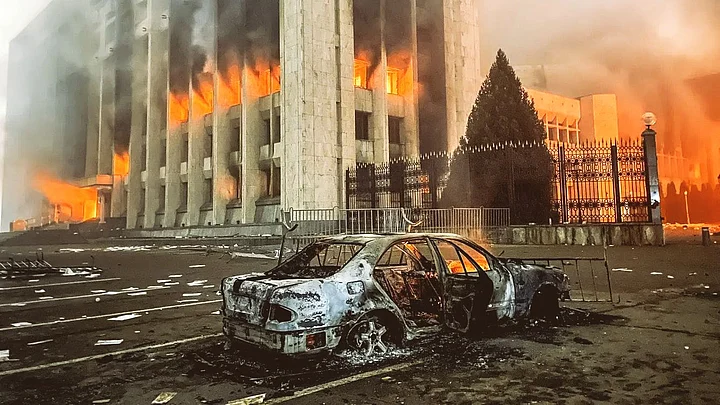The first week of 2022 witnessed the worst tragedy ever experienced by Kazakhstan since it became independent from the Soviet Union in December 1991. This short period witnessed President Kassym Jomart Tokayev emerge from the shadows and ruthlessly turn the tables on his mentor and patron Nursultan Nazarbayev, who had anointed him to the position of President in March 2019, when he suddenly decided to relinquish charge after having ruled the country for 30 years.
In his conversation with Charles Michel, the President of the European Union (EU) on 10 January, Tokayev termed the events of the last few days as “a terrorist attack … with the participation of foreign militants … mostly from Central Asian countries, including Afghanistan.” He said there were militants also from the Middle East. Armed militants were waiting in the wings and joined the protests.
In an address to the leaders of the Collective Security Treaty Organisation (CSTO) the same day, Tokayev said it was an “attempted coup d’état”. According to the Kazakh Foreign Ministry, the attackers included individuals “who have military combat zone experience in the ranks of radical Islamist groups”.
How Tokayev Was Hobbled at Every Step
Although there are still many missing pieces in the jigsaw puzzle that will hopefully surface during the investigations by Kazakh law enforcement authorities over the next few weeks (“9,900 terrorists” have been taken into custody), it appears increasingly likely that vested interests in the country, possibly members of the Nazarbayev family and clan, tried to use the opportunity of the peaceful protests in the wake of uncapping of LPG prices over the New Year’s day to effect a coup against President Tokayev.
It has been known for some time that Tokayev has not been in full control of the administration because he was hobbled at every step by his predecessor. Although Nazarbayev demitted the office of President in 2019, he retained significant power by holding on to the lifelong Chairmanship of the powerful National Security Council (NSC). He was also officially ordained with the Title of “Elbasy” (Leader of the Nation), which bestowed him with many privileges, including immunity from any criminal prosecution and protecting his assets and of his family.
Soon after relinquishing office, Nazarbayev assumed further sweeping powers, abrogating to himself the veto power on the country’s most powerful decision-making positions.
Tokayev used the pretext of the protests becoming increasingly violent and uncontrollable, resulting in the storming and burning of the iconic Akimat (Mayor’s Office) and Presidential residence in Almaty, to strip Nazarbayev of his position as Head of the Security Council, sack Prime Minister Askar Mamin and his Cabinet, oust several Nazarbayev loyalists and declare a state of emergency for two weeks. He also dismissed Karim Massimov, Secretary of the Security Council and a close protégé of Nazarbayev, and had him arrested for treason on 8 January.
'Shoot to Kill Without Warning'
Tokayev lost no time in reaching out to Russian President Vladimir Putin on 5 January and requested for CSTO troops to quell the attacks by ”militants, bandits and terrorists”. It is to the credit of CSTO members viz Russia, Armenia, Belarus, Kyrgyzstan and Tajikistan that within a few hours, the request was approved and troops from all member states, but mostly from Russia, started arriving on the morning of 6 January. It has been clarified that these troops are in Kazakhstan for a limited period and will be used only to guard state and strategic installations.
In his address to the nation on 7 January, President Tokayev said that he had given orders to “law enforcement and the army to shoot to kill without warning”. He rubbished calls from abroad to “hold talks to resolve problems peacefully” and said that no negotiations could take place with criminals and murderers.
This persona of Tokayev is very different from the usual one of an urbane technocrat, deferential to Nazarbayev and without a popular support base of his own.
The quick decision by CSTO appears to be an assertion by President Putin that Russia is the prime security provider in the former Soviet space and will not hesitate in taking tough decisions to protect its interests and security in its periphery. Kazakhstan is an important, strategic partner of Russia. This will make Kazakhstan beholden to Russia and ensure that China – notwithstanding its expanding economic and security footprint in Central Asia in general, and in Kazakhstan in particular – will not be able to wean it away from Russia’s influence.
The terrorists appear to have been well-armed, well-prepared and spoke in a foreign language, possibly Arabic. It is obvious that a lot of groundwork was done to launch this coordinated and concerted attack. While the Kazakh intelligence structure has shown up to be either incompetent or complicit, President Tokayev has emerged as a bold and decisive leader who is strong, steady and unflinching, and is ready to take tough decisions to protect the lives and welfare of his people.
(Ashok Sajjanhar is a former Indian Ambassador to Kazakhstan, Sweden and Latvia. This is an opinion piece and the views expressed above are the author’s own. The Quint neither endorses nor is responsible for them.)
